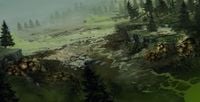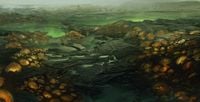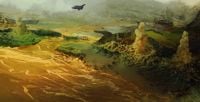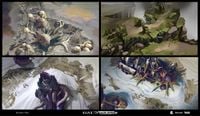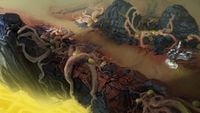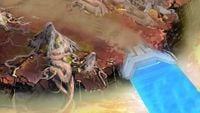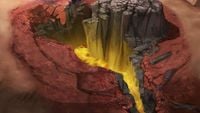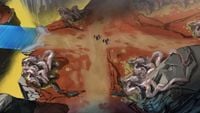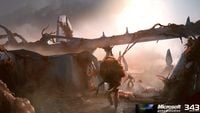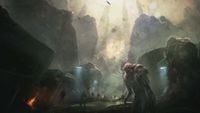Blightlands
From Halopedia, the Halo wiki
Blightlands are large regions which have been infested by the Flood. While the Flood are capable of operating in almost any environment (including the vacuum of space), the Flood Super Cell (FSC) generally has a fairly narrow band of habitability where it is most effective. In more localised Flood outbreaks, this kind of ideal environment can be established in the climate-controlled conditions of a Flood hive; however, for larger infestations, conversion of a region into blightlands offers many of the same functions.[1][2] This conversion generally begins once the Flood has entered the Coordinated Stage of an outbreak.[2]
The establishment of a blightland begins around a hive or Cocooned base[3], with specialised Flood growths emerging that are designed to harvest nutrients from the soil, soak up solar energy, and consume all native life within its boundaries. Eventually, these zones are consumed to provide biomass for the construction of city-sized spore towers, oceans of FSC, and pseudo-organs that are designed to finish the process of consuming an entire planet.[1][2]
Static Flood growths generally found inside infested regions such as Blightlands include blisters, hives, dens, nests, colonies, Spore Mounds, spore launchers, roots, portas, and vents. Flood Blightstalkers are also some of the most dangerous keymind inhabitants of the blightlands, alongside any Graveminds or Proto-Graveminds that may reside at their heart.
History
Etran Harborage

Prior to 2531, a Flood outbreak on the surface of Trove had led to the establishment of Flood Blightlands across the shield world's outer surface. The infection of humans from the UNSC Spirit of Fire and Covenant forces would lead to the establishment of Flood dens, hives, nests, colonies and, most importantly, a Proto-Gravemind.[4][5][6] The shield world's destruction would ultimately destroy the blightlands here.
The Ark
Following the destruction of High Charity in the Battle of Installation 00, the gargantuan Flood hive's ruins were quarantined by the installation's Sentinels. Approximately three-hundred meters away from the perimeter, life stopped growing and the area was absent of any kind of noise.[7] For seven years, the Flood inside the quarantine zone would continue to fester until the shield was broken by Voridus during the Second Ark Conflict, hoping to salvage old war-era Covenant equipment from the ruins of the city.[8] The Flood would quickly escape this breach and begin turning the area surrounding the destroyed ruins of High Charity into a blightland, eventually cocooning UNSC and Banished bases and establishing a new Proto-Gravemind. The Gravemind was eventually destroyed by Banished Antlion artillery, however, and the Sentinel network activated to reenact the quarantine of the facility.[9]
Gallery
Development images
Concept art of Blightlands in Halo Wars 2: Awakening the Nightmare.
Blightlands on a Halo ring in Project Foundry.
Screenshots
Blightlands in the Forerunner-Flood war.
A simulation of New Mombasa-turned Blightlands.
Simulation of Flood combat forms in an urban Blightland.
Simulation of Blightlands rapidly spreading over East Africa.
Atriox standing before a Proto-Gravemind in the Blightlands surrounding the destroyed ruins High Charity.
List of appearances
- Halo 3 (First appearance)
- Halo Wars
- Halo: Combat Evolved Anniversary
- Halo: Spartan Assault
- Halo Wars 2
Sources
- ^ a b Halo Wars 2, Phoenix Logs: Blightlands
- ^ a b c Halo Encyclopedia (2022 edition), page 413
- ^ Halo Wars 2, Phoenix Logs: Cocooned Base
- ^ Halo Wars, campaign level Anders' Signal
- ^ Halo Wars, campaign level The Flood
- ^ Halo Wars, campaign level Shield World
- ^ Halo Wars 2, Pandora's Box
- ^ Halo Wars 2, campaign level What Could Go Wrong?
- ^ Halo Wars 2, campaign level Manifestation
| |||||||||||||||||||||||||||||||||



